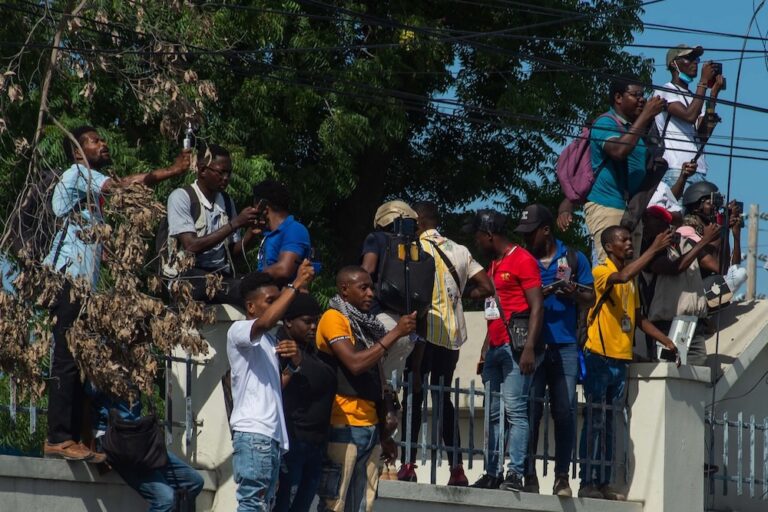March 2022 in the Americas: A free expression round up produced by IFEX's Regional Editor Laura Vidal, based on IFEX member reports and news from the region.
The region marked International Women’s Day, the press in Peru faced increasing challenges, and elections in Colombia made the work of journalists more complicated, especially in rural areas. Hopeful news for Nicaragua, as a new mechanism could plant seeds for justice and accountability for human rights violations.
A #MechanismForNicaragua approved by the UN Human Rights Council
As Nicaragua’s situation continues to worsen with harsh prison sentences given to journalists, civil society organisation staff, and political leaders through sham trials, the approval on 31 March of a special mechanism gives some hope for justice and accountability in the future. During its 49th session, the UN Human Rights Council (HRC) adopted a resolution that establishes a “Group of Experts on Human Rights” with a one-year mandate to investigate and seek accountability for serious human rights violations. IFEX-ALC joined Collective 46/2 in celebrating the creation of the mechanism. (Collective 46/2 is a coalition of 21 international, regional, and Nicaraguan human rights organisations monitoring the Nicaraguan government’s implementation of the recommendations in resolution 46/2, adopted by the HRC in March 2021.) For many of the leaders and organisations pushing for the creation of the mechanism, this is a victory for civic resistance and reason for hope that justice will be served for Nicaraguans in the future.
Organisations in Peru sound the alarm
In the last few months, organisations like local IFEX member the Institute for Press and Society-Peru (IPYS-Peru) have seen incidents and attacks against the press soar significantly, as President Castillo continues to perceive – and portray – them as antagonistic. After a difficult visit to the city of Arequipa, Castillo threatened to withdraw state advertising from media that “twisted the facts”. At the same time, access to interview the president is also quite difficult, with journalists coming up against police barriers to keep them away, and in some cases, bodyguards and press officials aggressively pushing away those trying to ask questions.
Castillo’s sympathisers have also been hostile, the most recent example being an attack against five journalists covering protests outside of Congress. In addition, we are seeing death threats, like the one made against journalist Gastón Medina, on top of other threats from government officials and cases of legal harassment.
In light of these and numerous other events, IPYS-Peru and the Asociación Nacional de Periodistas del Perú, together with the Peruvian Press Council, have asked IACHR Special Rapporteur on Freedom of Expression Pedro Vaca to visit the country.
A month to highlight women’s struggles for rights
There can be no healthy civic space without the full participation of women. International Women’s Day (IWD) is an important time to put women’s contributions front and centre – and come together to call out the obstacles being put in their path. People took to the streets in cities around the world to celebrate recent gains, as well as setbacks – many related to the actions of governments.
In Mexico, for example, protests in the capital were met with a remarkable police and military display which included several women naval officers. This sparked waves of criticism highlighting how little the government seemed to understand the threats and violence women endure, especially at the hands of law enforcement. In Ecuador, Human Rights Watch (HRW) called on the Ecuadorian government to investigate the excessive force used against peaceful IWD marches, which included indiscriminate use of teargas and pepper spray, and a journalist being struck with a club. Possibly the most symbolic display of contention was that of Guatemala’s Congress, which chose 8 March as the day they would pass a bill that could have restricted an already limited list of reproductive rights. The bill was ultimately shelved, but the fact remains that in this respect Guatemala continues to lag behind the rest of the region.
Meanwhile, numerous organisations made March a month full of discussions, with opportunities to build visibility and expand knowledge. IFEX member Abraji organised an event to present their 2021 report on gender violence in Brazil which found, among other things, an average of one gendered attack every three days. FOPEA, another IFEX member, held an online discussion to give space to the testimonies of women journalists in Argentina, as did Guatemalan outlet La Cuerda with research supported by Red Rompe el Miedo.
Numbers vary according to country, but common threads limiting women journalists involve online violence, lack of opportunities to move into new spaces, to report or grow into more senior roles (their own coworkers and superiors can be their aggressors); and systematic attacks that use sexist discourse regarding their professional and mental abilities, as well as their physical appearances.
International Women’s Day 2022 was also an opportunity to bring to the table the struggles Mexican women of African descent have to access information that reflects and is relevant to their lived realities. Meanwhile in Colombia, where women journalists and land defenders in rural areas face constant danger, the participation of Francia Marquez – a Goldman Prize award-winning land defender of African descent herself – in the 13 March elections was seen as an important step for inclusion in civic and political space.
… And speaking of elections in Colombia
Colombia’s legislative elections made for a complicated scenario for journalists across the country. IFEX’s Fundación para la Libertad de Prensa (FLIP) registered eight incidents in which the press had its work restricted in five departments. Journalists were blocked from approaching voting premises and were asked for special credentials. Political candidates used stigmatising discourse against them.
In rural areas the situation was even more fraught, particularly in the departments that set out to elect seats for the first time known as “victim seats” or “peace seats”. These roles were created as a form or reparation for victims of Colombia’s internal conflict in order to promote their participation in national politics and help advance the goals of the 2016 peace agreements. According to the Electoral Observation Mission, however, more than half of the departments in question were at risk of violence or fraud. Elections in these departments are marked by violence and intimidation. The presence of armed groups keeps these areas under threat, often through “armed strikes” (paros armados), like the one in late February where the National Liberation Army (Ejército de Liberación Nacional – ELN) blocked off national highways, carried out targeted killings, set off explosions, burned vehicles, and even hung their flag from public buildings.
All of this complicates and endangers the already risky work of local journalists. Some of these journalists were interviewed for FLIP’s podcast Perifoneo and explained how much of their work is simply walking people through the electoral process, and how difficult even this becomes in a climate of fear and violence.
In brief
Uruguay takes a controversial turn towards security over freedoms in a narrow vote. On Sunday 27 March, the referendum that had been polarising Uruguayan society resulted in the adoption of a law (commonly known as LUC) with far-reaching implications, especially in regards to freedom of speech and the right to protest. The passing of the law in 2020 had sparked concerns by local organisations, among them IFEX member CAInfo, as well as three UN Special Rapporteurs who urged the Uruguayan government to reconsider it.
Cuba has sentenced protesters to up to 30 years in prison for taking part in unprecedented and mostly peaceful demonstrations in July 2021. In the aftermath of the protests, HRW had denounced the Cuban government as engaging in “arbitrary detention, ill-treatment of detainees, and abuse-ridden criminal prosecutions in response to overwhelmingly peaceful anti-government protests”. In February 2022 the Inter-American Commission on Human Rights (IACHR) urged the Cuban government “to release all people being deprived of their freedom for participating in the protests.” In late March, 128 of those charged were found guilty of sedition and theft and two were sentenced to 30 years in prison.
El Salvador declares a state of emergency. A broad state of emergency was called following a remarkable spike in gang-related violence. The state is set to suspend a range of basic rights which, according to HRW, can also “open the door to abuse”. The IACHR has denounced mistreatment in prisons and its Office of the Special Rapporteur for Freedom of Expression has expressed concern as alerts of violence against journalists began to appear,
The carnage continues in Mexico. On Tuesday 15 March, unidentified attackers shot and killed journalist Armando Linares, the co-founder and editor of news website Monitor Michoacán, at his home in the central city of Zitácuaro. The murder took place just six weeks after he denounced the murder of his colleague Roberto Toledo, saying that Toledo had been targeted for exposing corruption. In a brief video statement, he said: “We don’t carry weapons. We only have a pen and a notebook to defend ourselves.” His is the eighth murder of a journalist in the country so far in 2022, compared with nine in all of 2021.



